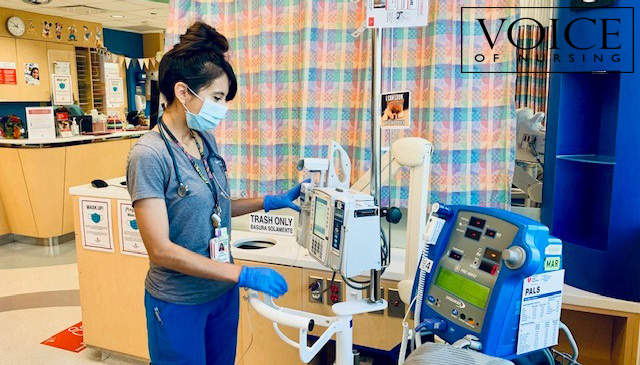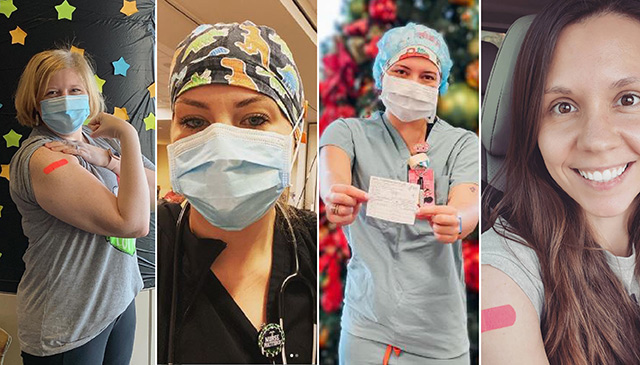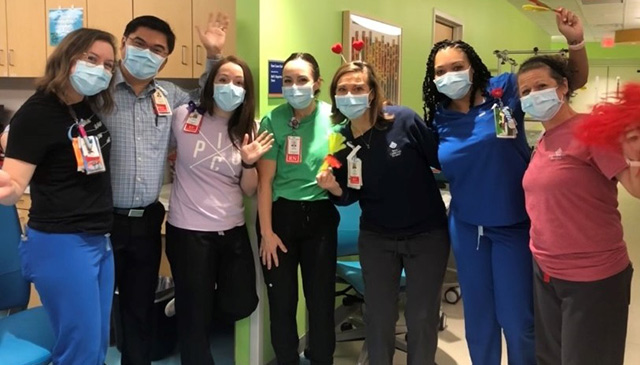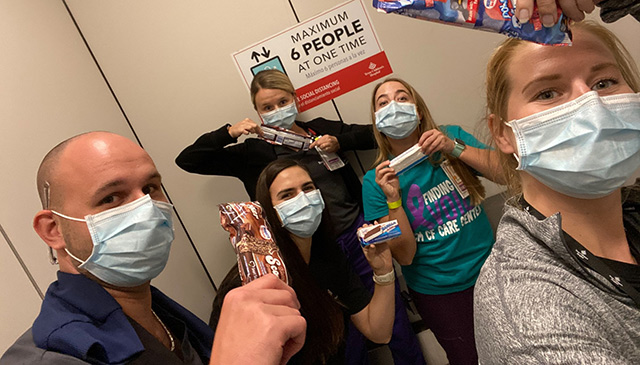
Despite the challenges we’ve faced during the COVID-19 pandemic, Anette Sandoval shares how a simple smile can leave a positive and lasting impression on our young patients. Read more

Despite the challenges we’ve faced during the COVID-19 pandemic, Anette Sandoval shares how a simple smile can leave a positive and lasting impression on our young patients. Read more

We’re at a critical stage in this fight against COVID-19 where everyone’s actions matter, regardless of vaccination status. As we respond to this latest surge, we need to work together and hold each other accountable for practicing safety 24/7.
During this latest surge, proper eye protection (goggles and face shields) is required in our clinical areas, including all in-patient, EC, WAC, peri-operative care and ambulatory environments. The most effective goggles are appropriately fitted, indirectly-vented with a manufacturer’s anti-fog coating. A face shield should have crown and chin protection and wrap around the face to the point of the ear.
At Texas Children’s, universal masking is required, regardless of vaccination status. This practice should not be reserved just for work. We need to mask everywhere, all the time, including the grocery store, social gatherings and any public events (although attending large-scale events is not recommended at this time). Masking remains one of the most effective ways to limit the spread of COVID-19, particularly in the community, where infections continue to rise rapidly.
It’s more critical than ever to protect ourselves and others. The Pfizer vaccine is now fully approved for individuals 16 years of age and above, which should bring both comfort and confidence to those still needing to be vaccinated. Vaccines protect individuals against consequences due to infection with the Delta variant. The Delta variant is highly contagious and readily transmissible among those who are vaccinated and unvaccinated. With few exceptions, vaccines are highly protective against serious illness/hospitalization and reduce the risk of transmission. Recently, the CDC’s Advisory Committee on Immunization Practices recommended allowing an additional dose for immunocompromised individuals, which we are administering to those who meet the guidance.

As we continue to battle through this latest wave of COVID-19, we’re reminding all Texas Children’s team members to excel at our safe practices while at work, at home and in public.
Texas Children’s remains among the safest places to work – even with a surge of positive cases in our communities – because of the precautions we’ve put in place, including universal masking, hand hygiene, daily screening and maintaining (and growing) our high vaccination rate. Although this has proven successful for us throughout the pandemic, we’re counting on you to remain diligent and to practice safety 24/7, at work and at home.

On Aug. 12, the Food and Drug Administration (FDA) amended its emergency use authorizations for both the Pfizer (12 years and up) and Moderna (18 years and up) COVID-19 vaccines, and on Aug. 13, the CDC’s Advisory Committee on Immunization Practices recommended allowing an additional dose for immunocompromised individuals.
With communities under threat from the Delta variant, these actions allow certain immunocompromised individuals to receive an additional mRNA vaccine dose to further protect against this highly contagious strain of the virus. For more details on this guidance, please see below:
With many of our patients considered to be immunocompromised – and at greater risk of serious illness due to COVID-19 – Texas Children’s began administering additional doses today.
If you feel you meet this new guidance for receiving an additional dose, and would like to schedule an appointment through Texas Children’s, you may do so now by clicking here. Please be sure to bring your vaccine card to your appointment.
For questions related to this new guidance, please contact our Vaccine Employee Support line at 832-VACCINE (832-822-2463).

After implementing bold action in June to show our appreciation for our team members’ contributions, Texas Children’s has just announced a new retention program that will impact every employee below the director and physician level – including part-time and per diem team members, and Baylor College of Medicine staff based at Texas Children’s.
President and CEO Mark A. Wallace announced the 1-2-3 Retention Program this week as another step forward in the Tomorrow, Together investment that Texas Children’s has made in our people. The program is designed to celebrate our team members’ tireless work and recognize your commitment to staying with the organization to advance our mission forward.
“Though our resilience may be tested, you prove time after time that our commitment to healthy women and kids will always be greater than our challenges,” Wallace said. “On behalf of our entire leadership team, please accept our 1-2-3 Retention Program as a way of honoring your loyalty to Texas Children’s, and for the compassionate care you help deliver every day for the women and children we serve.”
To download a handy chart about the 1-2-3 Retention Program, click here.
For answers to frequently asked questions about the Tomorrow, Together initiative, click here.

Transitioning from the relaxed sleep schedules of summer break to a back-to-school sleep schedule may appear daunting, but it is achievable with some preparation and patience. You would typically want to establish these school year sleep schedules at least a couple of weeks before the first day of school so your kids have time to adjust. However, do not lose heart if you begin the process later after school has begun. It’s never too late to introduce healthy sleep habits, as they are always beneficial to our kids’ physical and mental development.
Start by progressively waking up your kids 15 minutes earlier each morning and putting them to bed 15 minutes earlier than the previous day. This process will help you work towards having them ready and adjusted to sleeping the right amount while still waking up for school at the same time each morning.
Getting back on track is the first step. Now we have to maintain these healthy sleep habits throughout the school year. Here are some tips to help:

As teams across the organization continue to celebrate the recent Tomorrow, Together investment in our people, Texas Children’s is launching another special program to express our gratitude for our team members’ hard work and commitment.
In addition to the 50 percent discount on all purchases made at food courts and outlets at the Medical Center, West Campus and The Woodlands campus locations, we have sweet news we want to share.
Every Friday in August, all team members will get free ice cream, or another sweet treat, at all Texas Children’s locations. Make sure to grab a treat before or after your shift, overnight hours included.
Show off your smiles! Send your photos with your sweet treats and details to HR Communications for a chance to see your smile featured on Connect News and our social media channels.